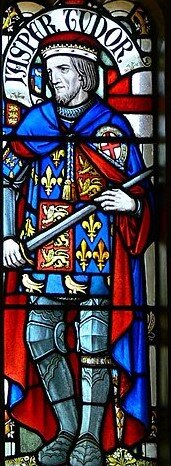May 19th 1471: Where was Jasper Tudor?

Sir Jasper Tudor.
Stained glass at Cardiff Castle
One of the many ‘what ifs’ connected with this campaign is what would have happened if Margaret’s army had met up with the Welsh forces being brought to her by Sir Jasper Tudor. His movements are not well documented.
Jasper Tudor was a dyed-in-the-wool Lancastrian. Since the execution of Owen Tudor, his father, in 1461, he had spent a lot of time in exile in France. He was present at Amboise when Warwick made peace with Margaret. He came back to England with Warwick’ invasion force and busied himself in Wales, avoiding becoming embroiled in the events which led to the Battle of Barnet, though he was active in the Lancastrian cause. He raised Herefordshire against Edward, who sent Sir Roger Vaughan to try to thwart his efforts.
When Margaret arrived, he was not among those who greeted her, but messages were quickly sent to him ordering him to array troops, and presumably stating a rendezvous time and place. Details are unclear, but the likelihood is that when Margaret’s army was cornered at Tewkesbury Jasper Tudor was marching his force past Chepstow and towards Monmouth. Close enough if Margaret had got into Gloucester, but too far away from Tewkesbury.
When he got news of the defeat at Tewkesbury, he retraced his steps back to south Wales. Edward had other concerns, so did not pursue him but instead commissioned Sir Roger Vaughan to do so ‘a man there both strong of people and of friends to the intent by some guile or engine suddenly to surprise and trap the earl’. This didn’t go well. Jasper’s power was strong in South Wales, despite the reversals in England. He seized Vaughan, a man he had no love for, and had him executed at Chepstow.
After this, Jasper Tudor retreated to Pembroke, beyond the immediate reach of King Edward.


No comments:
Post a Comment